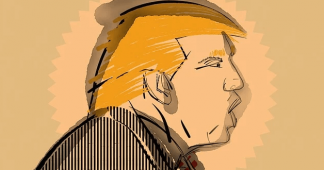“Section 230 is one of the most important laws protecting freedom of expression and human rights in the digital age.”
by Jan/27, 2021
A coalition of internet defenders on Wednesday cautioned lawmakers against responding to this month’s attack on the U.S. Capitol by making “uncareful changes” to section 230 of the Communications Decency Act that could “profoundly alter the state of digital free speech and human rights.”
The warning came in a letter to members of Congress and the Biden-Harris administration from a diverse collection of over 70 groups representing issues such as racial justice, sex workers, digital rights, and global human rights. Signatories include Common Cause, Fight for the Future, the National Center for Lesbian Rights, and the Wikimedia Foundation.
“Gutting Section 230 would make it more difficult for web platforms to combat the type of dangerous rhetoric that led to the attack on the Capitol. And certain carve-outs to the law could threaten human rights and silence movements for social and racial justice that are needed now more than ever,” the groups wrote.
At issue is legislation the Electronic Frontier Foundation (EFF) describes as “one of the most valuable tools for protecting freedom of expression and innovation on the Internet.” Section 230 states, “No provider or user of an interactive computer service shall be treated as the publisher or speaker of any information provided by another information content provider.”
What that means, as EFF summarizes, is that “online intermediaries that host or republish speech are protected against a range of laws that might otherwise be used to hold them legally responsible for what others say and do”—a framework that “has allowed for YouTube and Vimeo users to upload their own videos, Amazon and Yelp to offer countless user reviews, craigslist to host classified ads, and Facebook and Twitter to offer social networking to hundreds of millions of Internet users.”
But an overhaul of the law may be on the horizon.
As Business Insider reported earlier this month:
“Section 230 has come under heavy fire from Trump and the Republicans, who claim that the Big Tech companies discriminate against conservatives. Trump called for the revocation of Section 230 numerous times, and vetoed a $741 billion defense bill over it in December.
A new administration does not mean reform of Section 230 will be abandoned, as Democrats have also attacked the law, saying it gives the tech companies too much legal protection for hosting harmful content. President-elect Joe Biden in January said he was in favor of repealing it.
This could place tech companies in major jeopardy, as it would expose them to huge legal risk for what their users post, and with the Democrats controlling both Houses they now have more of a chance of legislating Section 230 how they see fit.”
The possibility of major or ill-conceived changes to the law, the groups warn, should be cause for serious concern.
In their letter, they argue that the “danger posed by uncareful changes to Section 230 is not theoretical,” pointing to impacts from the FOSTA/SESTA legislation of 2018 that altered the law and “put lives in danger.”
Contrary to its purported aim, FOSTA/SESTA limited “the accounts of sex workers and [made] it more difficult to find and help those who were being trafficked online.” Investigating such impacts of the 2018 legislation, as Sen. Elizabeth Warren (D-Mass.) and Rep. Ro Khanna (D-Calif.) have called for, must occur before further changes to Section 230 are pursued, the groups wrote
Attacking Section 230 is a hollow gesture with severe consequences for our communities. This is the wrong direction, so we're joining our allies to protect our digital spaces from knee-jerk policies like this: https://t.co/xMIe2nmW34 https://t.co/kJoFZ81RtZ
— MediaJustice (@mediajustice) January 27, 2021
What’s more, “[o]verly broad changes to Section 230 could disproportionately harm and silence marginalized people, whose voices have been historically ignored by mainstream press outlets,” the letter states. “For example, social media platforms would be unlikely to host viral videos of police violence that have spurred nationwide uprisings for racial justice if they faced constant litigation from law enforcement for doing so.”
The letter also notes how the law played a role in tech companies’ decisions to boot former President Donald Trump from platforms after using them to incite the extremist mob that attacked the Capitol January 6:
We share lawmakers’ concerns with the growing power of Big Tech companies and their unwillingness to address the harm their products are causing. Google and Facebook are just some of the many companies that compromise the privacy and safety of the public by harvesting our data for their own corporate gain, and allowing advertisers, racists and conspiracy theorists to use that data to target us. These surveillance-based business models are pervasive and an attack on human rights. But claims that Section 230 immunizes tech companies that break the law, or disincentivizes them from removing illegal or policy-violating content, are false. In fact, Amazon has invoked Section 230 to defend itself against a lawsuit over its decision to drop Parler from Amazon Web Services due to unchecked threats of violence on Parler’s platform. Additionally, because Section 230 protects platforms’ decisions to remove objectionable content, the law played a role in enabling the removal of Donald Trump from platforms, who could act without fear of excessive litigation.
A repeal of Section 230 could leave smaller companies ill-equipped to “engage in good faith moderation of hateful speech and disinformation,” forcing their shutdowns and thus leading to “even more powerful” big tech companies.
Evan Greer, director of Fight for the Future, stressed that a lot is at stake with a potential reform to Section 230.
“This is not a game,” said Greer. “Section 230 is one of the most important laws protecting freedom of expression and human rights in the digital age.”
“Lawmakers need to listen to the communities who are most impacted by systemic injustice before they enact legislation that could do enormous harm to vulnerable communities, silence activists, and put lives in danger,” she said.
Erin Shields, national organizer with MediaJustice, sounded alarm as well.
“Unregulated tech companies have been allowed to make up their own rules for decades and as a result they’ve weakened democracy, enabled violent white supremacists, and facilitated the spread of disinformation,” she said.
Shields also called for scrutiny of social media platforms “as we assign blame for the violent attack on the Capitol.” However, she cautioned, “repealing Section 230 would only further entrench tech companies as judge and jury over content on the internet, a role they’ve proven ill equipped to perform without harming the speech and safety of people of color and other marginalized voices.”
Instead, she said that solutions “need to be focused on breaking up tech’s concentration of power, wealth, and control. Anything short of that is insufficient.”
Published atwww.commondreams.org











